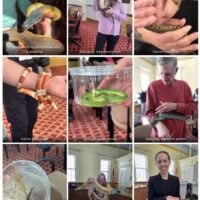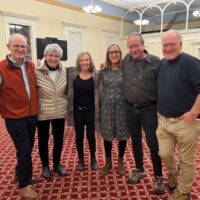In the 1600s, Concord farmers used the land now known as Acton as a grazing pasture for their cows and other animals. Today the community of Acton has more than 24,000 residents and depends on conservation lands to preserve open space for present and future generations. Susan Mitchell-Hardt, president of the Acton Conservation Trust (ACT) for the past 25 years, has worked hard to save local properties from development and preserve their natural resources and beauty. The nonprofit, volunteer-staffed organization she heads works closely with the town of Acton and targets priority properties to protect, based on the Town Open Space and Recreation Plan. It also offers nature-oriented events to engage the community.

ACT trains and partners with the Sudbury Valley Trustees (SVT) in land protection. In recognition of her preservation efforts, the SVT presented Mitchell-Hardt with a life-time achievement award on October 18. “Susan’s positive and abundant energy are what makes her great to work with and how she is able to accomplish so much!” says Laura Mattei, Director of Conservation for Sudbury Valley Trustees.
In a recent interview, Mitchell-Hardt recounted how her love for riding horses during her Ohio childhood led her to develop a strong connection to open space. When her family of six (plus two horses and a pony) moved to Spring Hill Farm in Acton, the surrounding area faced development pressures. Conservation-minded neighbors in Acton and Concord fought back, teaching Mitchell-Hardt valuable lessons in community action and land trusts. Starting in 1995, she participated in successful campaigns to preserve Camp Acton and the Morrison Farm. In 1998, she teamed up with Karen O’Neill to revive the Acton Conservation Trust.
After Massachusetts passed the Community Preservation Act (CPA) in 2000, Mitchell-Hardt chaired a local ballot question committee, whose efforts resulted in adoption of the CPA by the town of Acton. Due in large part to the CPA, ACT has been able to initiate projects leading to the preservation of 11 properties with more in the pipeline. Recent land acquisitions have included: a critical portion of woods ringing Great Hill field in South Acton, 10.9 acres of scenic land along Grassy Pond and Newtown Road, and 12 acres abutting the Mt. Hope Cemetery entrance to the Heath Hen Meadow Brook Conservation Land, allowing for greater access and extension of trails.
Mitchell-Hardt has also helped lead efforts to create an Agricultural Commission in Acton and pass a Right-to-Farm bylaw. In addition to being president of ACT, she has volunteered for town committees, including Open Space, Community Preservation, and East Acton Village.
ACT begins the process of preserving land by contacting owners of “priority parcels”— those adjoining existing conservation lands or stand-alone properties. After expressing interest in conservation for their property, Mitchell-Hardt meets with the owners, and they walk the land together. Next, ACT presents a proposal to the Open Space Committee, and the Chair of the Committee brings it to the Select Board to get their buy-in. If approved by the Select Board, it goes to town meeting for a vote. At this stage, ACT launches a campaign that includes familiarizing voters with the property, letter-writing, leading walks, fund-raising, and turning out the vote.
“These things can take 15 to 20 years from first contact to bearing fruit, so to speak,” says Mitchell-Hardt. “We plant the seed, let them know the town has a great deal of interest, and try to maintain contact on a regular basis. Then suddenly they can get inspired to sell the property for one reason or another, and it happens.” Mitchell-Hardt uses her enthusiasm and persuasive skills to encourage owners to conserve their property. While there is a conservation land tax credit, for most people, says Mitchell-Hardt, the real incentive is “feeling good that you’ve created a legacy that might be a model for other people who want to do the same thing and can afford to.”
Susan and her husband, Dave, are still stewarding Spring Hill Farm, battling invasives, preserving the 1750 house and 1820 barn, and encouraging their children to get involved with their local land conservation trusts. Leading by example, they have recently applied for a conservation restriction on a portion of their own property.


